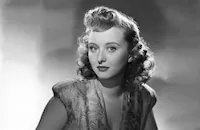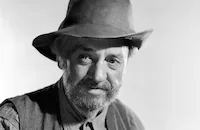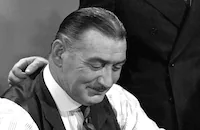Chicken Every Sunday

Brief Synopsis
Cast & Crew
George Seaton
Dan Dailey
Celeste Holm
Colleen Townsend
Alan Young
Natalie Wood
Film Details
Technical Specs

Synopsis
In Tucson, Arizona, in 1910, Emily Hefferen visits attorney Charley Blaine to get a divorce. When Charley objects, saying that her husband Jim is one of his oldest friends, she angrily enters the office of Robert Hart, a lawyer new to town. Emily cites "non-support" as grounds, and Hart is incredulous, as he has seen the Hefferen name on the hotel, laundry and creamery, and assumed that he practically owned the town. Emily then tells him her story: On their wedding day twenty years earlier, when there is not much else in the town other than the church, she learns that Jim, the vice-president of the bank, has given away and lost all his money on bad investments. However, she is not surprised by the news and when they arrive at their new home in the desert on the outskirts of town, Jim finds, to his dismay, that Emily has taken in another honeymoon couple, the Lawsons, as boarders in order to make the mortgage payment. As each of Jim's new ventures fail, Emily takes in additional boarders. When the construction of the town's hospital, which Jim had started in order to accomodate Emily, who is due soon to have a baby, is halted, Jim volunteers the necessary funds to complete it, and at the dedication ceremony, Emily becomes the hospital's first customer, as she gives birth to their daughter Rosemary. Jim then gets an idea to start a laundry, but he is not satisfied with its modest profit, and a few years later, sells it to build a store. He then sells the store to start a creamery, which pays for an opera house, which, in turn, provides money to build a hotel. Meanwhile, Jim and Emily have two more children, and every time Jim starts a new business, Emily adds a new room to the house and takes in more boarders. At Rosemary's high school commencement ceremonies, Jim receives a summons, and the bank takes over the hotel, but Emily, who is successfully running the boardinghouse, is now resigned to her fate. She then relates to Hart that two months before, Jim took out a thirty-day option on an arroyo that he hopes to mine for copper. When Rita Kirby, an attractive, but cheaply attired woman, who is hiding from her husband, arrives looking for a room, Jim, despite Emily's disapproval, insists that she stay because he thinks her husband George, who owns a construction company in New Jersey, might invest in the copper mine. Without Rita's knowledge, Jim sends Kirby a wire from her asking him to come. Jim starts the mining operation and gets Mrs. Lawson's son Geoffrey, who is cajoled by his overly protective mother to build up his body by working for him. After getting waltz lessons from Emily, who encourages him to date Rosemary, Geoffrey summons up enough courage to ask her to the annual Pioneer Ball. When the band plays an upbeat "Texas Tommy," Geoffrey, not knowing what to do, allows Rosemary's other suitor, Harold Crandall, to cut in, to Rosemary's dismay. Crandall, who brags about his distinguished Boston pedigree, annoys Emily, as she is proud of her Southern roots. When Kirby arrives, he refuses to talk business until he straightens out his personal affairs, and dumps his drunken mother-in-law, Minnie Moon, an ex-vaudevillian, whom Rita also left, at the Hefferen's house. Although Emily objects, the $250 check Kirby writes gives her enough money to pay off the mortgage, and she plans to burn it the next day at a party. Jim encourages Rita to make up with her husband by telling her that Kirby plans to give her expensive presents for Christmas. When the man owning the arroyo threatens to rip out the mine unless Jim buys it that day, he secretly takes out a new mortgage just after Emily buys the old one, hoping to buy it back after Kirby invests. However, during Emily's party, Kirby learns that the miners have found water, not copper, and puts away his checkbook. Afterward, banker Sam Howell begins to repossess the Hefferen furniture. Back in Hart's office, Emily concludes her tale in tears, then returns home and finds the furniture being returned. She learns that Jim's friends chipped in to pay off the loan. Jim, ashamed for not realizing that "easy street" has always been right there, packs to leave. On his way out, he overhears Rosemary tell her mother that he is not a failure as a human being, and Emily admit that his failed ventures have been responsible for giving the town a hospital, creamery, laundry, restaurant and hotel. She says she now realizes that security is two people loving each other and going through everything together. When Rosemary reveals that she and Geoffrey, who the previous evening knocked out Harold, are engaged, Emily says she hopes they will be as happy as she and Jim have been. Jim then sneaks up the backstairs, and when Emily hears his footsteps, she joyously runs to his embrace.

Director
George Seaton
Cast

Dan Dailey

Celeste Holm
Colleen Townsend

Alan Young

Natalie Wood

William Frawley

Connie Gilchrist
William Callahan

Veda Ann Borg

Porter Hall

Whit Bissell

Katherine Emery

Roy Roberts
Hal K. Dawson
Percy Helton
Mary Field
Anthony Sydes
H. T. Tsiang
Loren Raker
Junius Matthews
Dick Ryan
Ruth Rickaby

Edward Keane
Jack Kirkwood
Francis Pierlot
Wilson Wood
Eddie Laughton
Frank Meredith
Jack Daley
Lynn Farr
Frank Scannell

George Beranger
Douglas Gerrard
Frank Mills
Dave Morris
Snub Pollard
George Davis
Douglas Carter
Sam Ash
Sophie Schoenenberger
Paul Kruger
Jean Spangler
Carl A. Bolin
Crew
Alfred Bruzlin
Valentine Davies
Gus Edwards
Charles Hall
Roger Heman
Charles Henderson
Richard Irvine
Harry Jackson
Arthur Jacobson
Charles Lemaire
Thomas Little
Ed Madden
Jack Mahoney
Ray C. Moore
Kay Nelson
Alfred Newman
Ben Nye
William Perlberg
Jack Perry
Edward Powell
Stuart Reiss
George Seaton
Fred Sersen
Robert Simpson
H. S. Thompson
Egbert Van Alstyne
Percy Wenrich
Lyle Wheeler
Harry Williams

Film Details
Technical Specs

Articles
Chicken Every Sunday
The project started as a 1943 novel by Rosemary Taylor entitled Chicken Every Sunday: My Life with Mother's Boarders, which was turned into a 1944 Broadway play by Julius J. and Philip G. Epstein. Warner Brothers bought the movie rights and had the Epstein brothers craft a screenplay. (The Epsteins, of course, were Oscar®-winning screenwriters with Casablanca [1942] and Arsenic and Old Lace [1944] to their credit.) In 1945, however, Warners gave up on the project and sold the rights to Fox. The new studio commissioned its own screenplay, by Valentine Davies and George Seaton, and planned it as a vehicle for Gene Tierney. She turned it down and went on suspension. John Payne was considered for the male lead, and then for a time it appeared as if Henry Fonda and Maureen O'Hara were set for the film, with Jeanne Crain being considered for their daughter. In the end, the cast went down a notch to the decidedly less glittery Dan Dailey, Celeste Holm and Colleen Townsend (as the daughter) with George Seaton directing.
Rosemary Taylor's original novel had been touted as a personal memoir of rural life in early 20th-century Tucson, but a note from the author in the studio file reveals her story was actually mostly a concoction. In any case, the story centers around a Tucson woman (Holm) who is exasperated with her husband's (Dailey's) endless get-rich-quick schemes, none of which ever seem to work out. To stay afloat, the practical Holm rents out their spare rooms to boarders, all of whom are eccentric in one way or another, and the marriage becomes threatened.
The movie was received respectfully but caused no great shakes. The New York Times called it "good, substantial cooking in the Hollywood style" but was bothered by the film's resemblance to the previous Life with Father and I Remember Mama, describing the new release as "familiar sentimentality" that amounted to "diggings in a pretty well dug-over vein."
Chicken Every Sunday was the seventh credited feature for young Natalie Wood, whose hair was dyed blond to match Holm's. It was a small part for Wood, but according to biographer Suzanne Finstad (Natasha: The Biography of Natalie Wood), she "received star treatment at Fox. The studio provided a limousine and driver to take her to and from Carson City, Nev., to shoot the exterior scenes." On July 20, 1948, Wood celebrated her tenth birthday on the set, and the studio brass arranged for all the other kids on the lot to come over and sing "Happy Birthday." Wood's parents gave her a microscope as a reward for completing the film, and then little Natalie immediately went on to her next picture, The Green Promise (1949), an RKO release.
As an example of how much pop cultural resonance this film had at the time (along with the novel and play), the title was spoofed in a 1951 Warner Bros. cartoon starring Bugs Bunny and Yosemite Sam: Rabbit Every Monday.
Producer: William Perlberg
Director: George Seaton
Screenplay: Valentine Davies, George Seaton; Julius J. Epstein and Philip G. Epstein (play); Rosemary Taylor (book)
Cinematography: Harry Jackson
Art Direction: Richard Irvine, Lyle Wheeler
Music: Alfred Newman
Film Editing: Robert L. Simpson
Cast: Dan Dailey (James C. 'Jim' Hefferan), Celeste Holm (Emily Hefferan), Colleen Townsend (Rosemary Hefferan), Alan Young (Geoffrey Lawson), Natalie Wood (Ruth Hefferan), William Frawley (George Kirby), Connie Gilchrist (Millie Moon), William Callahan (Harold Crandall), Veda Ann Borg (Rita Kirby), Porter Hall (Sam Howell), Whit Bissell (Mr. Robinson/Robby), Katherine Emery (Mrs. Mildred Lawson).
BW-94m.
by Jeremy Arnold

Chicken Every Sunday
Quotes
There are other homes in town that take in guests.- Emily Hefferan
Yeah, I tried 'em all. Those dumps are full too. I mean... nice place you got here.- Rita Kirby
Trivia
Notes
A condensation of Rosemary Taylor's novel was published in Reader's Digest in September 1943. In a letter in studio files, author Taylor noted, "Don't let the public know, please, but most of 'Chicken' was either fiction or facts so scrambled as to be unrecognizable. Only our family names are real." However in a New York Times article dated April 2, 1944, Taylor noted that the book was "a story about my family." According to information in the Twentieth Century-Fox Records of the Legal Department located at the UCLA Arts-Special Collections Library, Warner Bros. bought the motion picture rights in August 1944; in August 1945, Fox paid Warners $275,000 for the rights. During the period in which Warner Bros. owned the rights, Julius J. and Philip G. Epstein, who wrote the play based on the novel, wrote a screenplay based on the play and novel and Mervyn LeRoy was slated to direct it. It is not known if the Epstein screenplay was later used by the Fox writers. Mary C. McCall, Jr. wrote a screenplay and revisions for Fox, but the extent of her contribution to the final film has not been determined.
Hollywood Reporter news items indicate that John Payne was considered for a top role in the film. According to publicity for the film in the AMPAS production files, Maureen O'Hara and Henry Fonda were scheduled to play the leads, and Vanessa Brown was listed in the cast in September 1946. Jeanne Crain was scheduled for the role of the daughter when production was to begin on November 4, 1946, and later Hollywood Reporter news items indicate Betty Ann Lynn was cast as her replacement. Studio legal files note that Veda Ann Borg replaced Martha Stewart in the role of "Rita Kirby." According to information in the studio's Produced Script Collection, also at UCLA, the studio planned to test Florence Bates for the role of "Minnie Moon." The film was postponed a number of times due to actors' scheduling conflicts. The Tucson Mountains area was used for backgrounds. Other location shooting was done in the Nevada towns of Gardnerville, Minden, Carson City, Virginia City and Silver City, according to publicity and the legal records.
On June 13, 1956, The Hefferen Family, also based on the Taylor story, was broadcast on television as part of the Twentieth Century-Fox Hour. It was produced by Samuel Marx, directed by Jules Bricken and starred Paul Douglas and Alexis Smith. According to a Daily Variety news item in 1960, Julius J. Epstein, the estate of his late brother Philip, and author Taylor initiated a copyright infringement-breach of contract suit against the studio in 1959, contending that Fox did not own the television rights. The studio settled out of court for $100,000. A musical, entitled East Street, West, with book by Julius J. Epstein, and music and lyrics by Jay Livingston and Ray Evans, based on the Epsteins' play, was to be tried out in 1966 or 1967, but no information on its production has been located.














